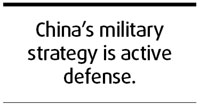A military strategy to match peaceful rise
By Chen Zhou (China Daily)
Updated: 2008-05-16 07:40
Updated: 2008-05-16 07:40
China's military strategy is active defense. The world is in the process of major changes and adjustments. Peace and development remains the principal theme in today's world and the overall international security environment remains stable. But, uncertainties and destabilizing factors are on the increase. Traditional and non-traditional security issues are intertwined and the international community is increasingly facing comprehensive, diverse and complex security threats.
China's overall security environment remains sound. There is no real threat of large-scale enemy invasions. However, China's security still faces challenges that must not be neglected.
Modernizing a huge country of 1.3 billion people is an unprecedented exercise and China faces security issues that arise in the process of social, economic, ecological and other developments. Reform in China is at a critical stage, as there is much room for improvement in market economy, and we have become more dependent on the global economy. The three vicious forces of terrorism, separatism and extremism pose an increasingly grave threat to security in China's border areas. While traditional security threats driven by military and political motives still exist, non-traditional security concerns on economy, information, energy resources, strategic shipping channels, ecology and terrorism are on the rise.
As a country that is yet to achieve ultimate unification, China is faced with an arduous task of opposing independence of Taiwan. The Taiwan issue concerns China's sovereignty and territorial integrity, and therefore involves China's core interest. It is the most important task for China to firmly oppose and stop separatist activities in Taiwan.
In order to adapt to the changes of international strategic situation and national security environment, China instituted the military strategy of active defense in the new period. Its main contents are as follows.

First, take winning information-centric local wars as the overall objective. The principal contradiction faced by the Chinese People's Liberation Army (PLA) in its modernization drive is that the level of modernization cannot match the requirements of winning information-centric local wars. Going with the tide of the world's military development and steer the modernization drive toward information-centric defense, the PLA will promote the simultaneous development of information warfare and mechanization; gradually complete the transition from mechanized and semi-mechanized to information-centric defense; and achieve overall capability improvement in the fields of firepower, assault, mobility, protection and information.
Second, prevent conflicts and wars. In order to secure the key strategic window of opportunities for national development and the overall national interests, the PLA is committed to complementing political, economic and diplomatic endeavors with any military strategy and tactics necessary to prevent conflicts and wars. China will always follow the nuclear policy of never to be the first to use nuclear weapons and the strategy of nuclear arms for self-defense only. Its fundamental goal is to convince any country planning and threatening to use nuclear weapons against China that it is suicidal to start a nuclear war. And China will never join a nuclear arms race with any other country.
Third, enhance the capability of conducting joint operations and accomplishing diversified military tasks. In order to meet the requirement of modern warfare and deal with various security threats, the PLA bases its battle preparedness on joint operations, focuses on enhancing deterrent and real-war operational capabilities of the armed forces as well as the capability to conduct military operations without a war.
Fourth, push forward the revolution in military affairs with Chinese characteristics. In order to meet the challenges of the worldwide revolution in military affairs, the PLA implements a strategy to improve the quality of the armed forces and build a strong military by means of science and technology. The PLA tries to enhance the innovative capability and develop national defense science and technology; conduct training for information-centric warfare and rear a generation of high-caliber military personnel primed for the future.
Fifth, develop the strategy and tactics of people's war. China's real advantage and strength comes from relying on the people to develop and fortify national defense. In face of the ever-changing modern warfare, China exercises the combination of a streamlined standing army with a powerful reserve force for national defense, paying great attention to the development of reserve forces and the militia. It has created and perfected a unified and highly-efficient defense mobilization mechanism in accordance with the principle of combining peacetime needs with wartime needs and the army with the people, and having reserve soldiers among the people; and is working on new battle tactics suitable for the people to participate in under modern conditions and exert the overall might of people's war.
Sixth, foster a security environment conducive to China's peaceful development. Implementing the strategy and foreign policy of peaceful development, the PLA develops cooperative military relations that are non-aligned, non-confrontational and not directed against any third party, opposes power politics and hegemony. China participates in UN peacekeeping operations, international counter-terrorism cooperation and international disaster relief operations.
It plays an active part in maintaining global and regional peace and stability. Since 2002, China has held 18 joint military exercises with 11 countries. Since 1990, China has sent more than 9,000 personnel to participate in 18 UN peacekeeping operations. Eight lost their lives on duty. Among the five permanent members of UN Security Council, China has become one of the countries that sent the most peacekeeping troops. At present, China has 1,700 military peacekeeping personnel serving in UN peacekeeping operations.
In addition, PLA personnel have joined in international rescue operations after the Indian Ocean Tsunami and the earthquakes in Algeria, Iran, Indonesia and Pakistan. They are also active participants in rescue work in domestic disasters such as earthquakes and floods.
The author is a researcher with PLA's Academy of Military Science
(China Daily 05/16/2008 page8)
|
|
|
|